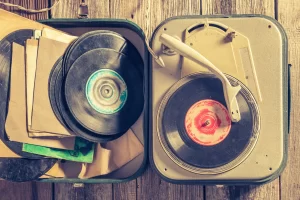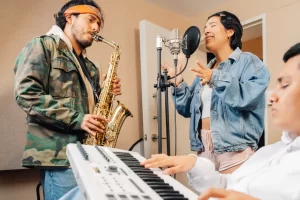Music, in its melodic embrace, holds a unique power to unlock the vaults of our memories, transporting us to different times and places within the opening bars of a song. This fascinating interplay between music and memory forms the essence of countless personal histories, intertwining melodies with moments in a dance that spans a lifetime. Each chord and lyric can evoke a spectrum of emotions and vivid recollections, from joyous celebrations to poignant farewells.
This article delves into the intricate bond between music and our personal narratives. It explores the potent ability of music to trigger emotional and nostalgic responses, acting as a key to unlock memories that might otherwise remain hidden. Beyond mere entertainment, music emerges as a significant marker of our life’s journey, etching memories in the soundtrack of our existence.
Through an exploration of the science behind this phenomenon, personal anecdotes, and the role of music therapy, we’ll uncover how songs become inextricably linked with our individual and collective experiences. From the lullabies of our infancy to the ballads that echo through our adult years, music is not just a background score but a vital thread in the tapestry of our personal histories. Join us as we explore the profound and enduring connection between music and memory, a relationship that shapes our past, present, and future.
The Science of Music and Memory
The intricate relationship between music and memory is deeply rooted in the way our brains process and respond to music. Neuroscientific research reveals that music activates broad neural networks in the brain, including areas responsible for emotion, sensory perception, and memory recall. When we hear a familiar tune, our brain swiftly links it to specific memories and feelings, often from significant moments in our lives. This connection is so strong that even a few notes can instantly transport us back in time, evoking vivid recollections and emotions.
This phenomenon is partly due to the way music is encoded into our memories. Unlike other forms of memory, which might fade over time, musical memories often remain remarkably intact, even in the face of cognitive decline. This resilience of musical memories is particularly evident in individuals with dementia or Alzheimer’s disease. They may struggle to recall names or faces but can often remember and sing along to songs from their youth with surprising clarity. This enduring nature of musical memories points to the deep-seated and unique way music interacts with our brains.
Moreover, the emotional charge of music plays a pivotal role in memory recall. Music is not just a sequence of notes and rhythms; it’s a rich emotional language. The feelings evoked by a particular song can be as powerful as the melody itself, embedding the music deeply into our personal narratives. Whether it’s the joy of a dance at a wedding or the melancholy of a song that reminds us of a lost love, the emotional resonance of music makes it an indelible part of our memory tapestry, coloring our life stories with its melodies.
Music as a Time Capsule
Music possesses an extraordinary ability to function as a time capsule, capturing and preserving moments from our past. A particular song can embody the essence of a specific period in our lives, instantly recalling the sights, sounds, and emotions of those days. It’s as if each melody is intertwined with the fabric of our personal history, holding within it the power to bring past experiences back to life.
These musical time capsules often extend beyond individual memories, embodying the shared experiences of a generation. A certain track can evoke the cultural and social atmosphere of an era, resonating with collective memories. For example, the songs of the 1960s might recall the spirit of change and rebellion, while the 1980s’ tunes could bring back memories of bold fashion and digital innovation. These songs become not just personal mementos but markers of historical and cultural moments.
Moreover, music’s role in marking significant life events is profound. From birthday celebrations to graduation ceremonies, weddings to funerals, music punctuates our life’s major milestones. These songs become deeply associated with these events, echoing the emotions and significance of those occasions every time they are played. In this way, music transcends its auditory nature, becoming a repository of our life’s most cherished moments, a timeless link to our past that remains ever-present in our memories.
Music Therapy and Memory
Music therapy has emerged as a significant tool in enhancing memory, particularly in individuals with memory-related conditions like dementia and Alzheimer’s disease. This therapeutic approach leverages the profound connection between music and memory to improve cognitive function and quality of life. Music therapy often involves activities like listening to familiar songs, singing, or even playing musical instruments, tailored to the individual’s preferences and abilities.
The effectiveness of music therapy in memory care is rooted in the unique way music stimulates the brain. For individuals with dementia, music can serve as a bridge to memories that seem otherwise inaccessible. Familiar melodies can trigger reminiscences, often allowing patients to momentarily reconnect with their identity and history. This can lead to moments of lucidity and recognition, providing a sense of comfort and familiarity in an otherwise disorienting condition.
Beyond memory recall, music therapy offers emotional and social benefits. Singing or listening to music can induce positive mood changes, reducing symptoms of depression and anxiety often associated with memory disorders. It fosters social interaction, as patients engage with therapists, caregivers, or fellow patients in a shared musical experience. This can alleviate feelings of isolation and help build a supportive community environment.
Personal stories from caregivers and therapists highlight the transformative impact of music therapy. Patients who are often withdrawn or non-communicative may suddenly light up and sing along to a familiar tune, revealing the enduring connection between music and their personal history. In essence, music therapy not only aids in memory recall but also enhances the overall well-being of individuals, making it a vital component in the care of memory-related conditions.
The Evolution of Musical Memories Over Time
The evolution of our musical memories over time is a fascinating reflection of both personal growth and changing societal landscapes. As we age, the songs that once defined our youth or specific life chapters can take on new meanings, revealing the dynamic nature of our relationship with music. Early musical memories, often formed during adolescence, are typically vivid and emotionally charged, reflecting the intensity of our first encounters with love, identity, and independence. These songs become anchors, tethering us to our formative years with an almost tangible sense of nostalgia.
As we traverse through different stages of life, our musical preferences and the memories associated with them also evolve. The songs that resonated with us in our younger years may no longer hold the same appeal, replaced by tunes that reflect our maturing tastes and experiences. This shift is not just a matter of changing musical styles; it’s a testament to music’s role in mirroring our journey through life. Our evolving musical memories become a mosaic, each piece representing a different era of our personal history.
Music’s ability to connect generations through shared memories adds another layer to its evolutionary role. Songs from past decades gain new life as they are rediscovered by younger generations, creating a bridge between different age groups. A grandparent and grandchild might find common ground in a classic tune, each relating to it in their unique way but sharing the connection it fosters.
Furthermore, the way we perceive music and its associated memories can change as we revisit past experiences. A song that once brought joy might evoke melancholy upon re-listening, as we overlay it with our accumulated experiences and insights. This re-interpretation of musical memories is a powerful reminder of music’s capacity to grow and adapt with us, offering a lens through which we can view our evolving selves.
The evolution of musical memories over time is not just a chronicle of changing tastes; it’s a reflection of our personal growth and the ever-shifting tapestry of human experience. Music, in its timeless and universal appeal, remains a constant companion, chronicling our lives’ stories through its melodies and rhythms.
Creating Personal Soundtracks
Creating personal soundtracks has become an increasingly popular way to chronicle one’s life journey through music. In this digital age, the ease of curating personal playlists allows individuals to capture and preserve the soundtrack of their lives, encapsulating various emotions, experiences, and phases. These playlists often serve as aural diaries, each track representing a chapter in the individual’s narrative, from triumphant moments to periods of introspection.
The act of curating these soundtracks is both reflective and forward-looking. It involves sifting through a myriad of songs to find those that resonate with personal milestones, moods, or even everyday experiences. This process can be deeply personal and introspective, as it requires one to revisit past emotions and moments through the lens of music. The resulting soundtrack becomes a personalized collection, a musical mirror reflecting the curator’s inner world and journey.
Technology plays a crucial role in facilitating the creation and preservation of these musical memories. Streaming services and digital libraries provide easy access to an extensive range of music, allowing individuals to seamlessly add to their personal soundtracks over time. Moreover, the ability to share these playlists on social platforms adds a communal dimension, enabling individuals to connect with others through shared musical tastes and experiences.
Crafting a personal soundtrack is more than just a hobby or pastime; it’s an ongoing process of defining and redefining oneself through music. It’s about capturing the essence of life’s fleeting moments and emotions in a format that transcends time. In essence, these personal soundtracks become living, evolving compositions that narrate the unique story of an individual’s life, set to the universal language of music.
To Sum It Up
To sum it up, the intricate bond between music and memory forms a fundamental aspect of our human experience, intertwining the rhythms and melodies of songs with the fabric of our personal histories. Music’s capacity to trigger memory, evoke emotion, and connect us to our past is not just a fascinating psychological phenomenon; it’s a powerful testament to the impact of art on our lives. As we navigate through different phases, the songs we encounter and cherish become more than mere sounds; they transform into sonic bookmarks, capturing and preserving our most significant moments and emotions.
The therapeutic potential of music, especially in the realms of memory care, underscores its profound role in not only recalling the past but also enhancing the present quality of life. For those grappling with memory-related conditions, music emerges as a beacon of hope, a key to unlocking lost memories, and a tool for emotional well-being. This therapeutic aspect extends music’s relevance beyond entertainment, situating it as a vital component in healthcare and emotional support.
As we evolve, so do our musical memories, reflecting our changing identities and perspectives. The songs of our youth might acquire new meanings as we age, while our personal soundtracks grow and adapt with us, encapsulating the story of our lives. In an era where technology enables us to curate and share these musical journeys, the creation of personal soundtracks becomes a dynamic way to document and share our individual narratives.
Music’s intertwining with memory is a dance as old as time, yet it remains as poignant and relevant today as ever. It’s a universal language that speaks to our shared humanity, echoing through the corridors of our past and resonating in the heart of our present, a timeless melody in the symphony of life.




